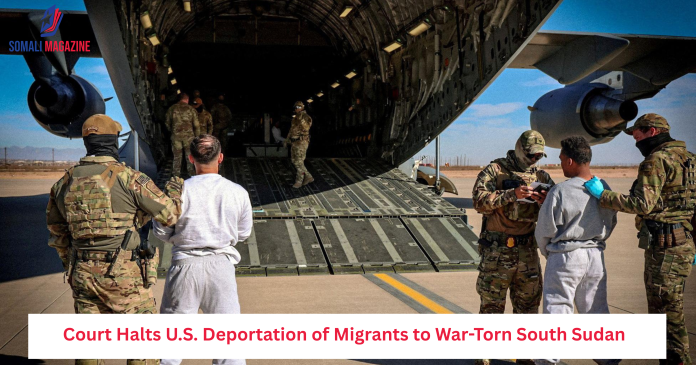Facebook Twitter (X) Instagram Somali Magazine - People's Magazine
Federal Judge Rules Migrants Must Be Given Time to Appeal Deportation Amid Fears of Torture, as They Remain Detained in Djibouti
A group of eight migrants deported from the United States are now being held in Djibouti after a federal judge blocked their transfer to South Sudan. The migrants were on a U.S. government flight on Tuesday, headed to the conflict-affected African nation, despite none of them being South Sudanese citizens—except for one.
The U.S. government said these individuals were expelled because they had been convicted of violent crimes. However, the Biden administration faced legal challenges when it attempted to send the group to South Sudan after failing to get approval from their countries of origin to take them back.
Now detained by the Department of Homeland Security (DHS) in Djibouti—a small East African country that hosts a major U.S. military base—the eight men await further legal decisions about their fate.
U.S. District Judge Brian Murphy, based in Boston, ruled that the administration had violated one of his earlier orders by not giving the migrants enough time to challenge their removal. The judge stated that the time they were given to appeal their deportation was “plainly insufficient.”
Judge Murphy emphasized that the United States is obligated under international law, specifically the United Nations Convention Against Torture, to give migrants facing removal at least ten days to challenge their deportation—especially if there is a risk of torture or inhumane treatment in the country they’re being sent to.
In his ruling, Judge Murphy allowed six of the eight migrants to legally argue their fear of torture or mistreatment if sent to South Sudan. They must be given legal support to do so. Even if immigration officials decide their fears are unfounded, the judge said they must still be given at least 15 days to appeal the decision.
South Sudan is a country plagued by political instability and violence. The U.S. State Department has issued travel warnings for the country, citing serious safety concerns.
The group of deported migrants includes two people from Myanmar, two from Cuba, and one each from Vietnam, Laos, Mexico, and South Sudan. According to lawyers, at least two of the men—one from Myanmar and the Vietnamese national—only found out about their deportation the night before or the day of the flight.
Although the Department of Homeland Security said that South Sudan was not intended as the migrants’ final destination, it did not clarify what other country might accept them.
Former President Donald Trump criticized the judge’s decision on his social media platform, Truth Social, accusing the court of protecting “violent criminals.” He claimed the judge had stopped the deportation of what he called “some of the most violent criminals on Earth” and allowed them to stay in Djibouti instead of continuing their journey.
Legal experts and human rights advocates say that the judge’s ruling is in line with international law and the responsibility of governments to protect individuals from being sent to places where they could face serious harm.
As of now, the future of the eight migrants remains uncertain. Their lawyers continue to work on their behalf while they remain in DHS custody in Djibouti.

